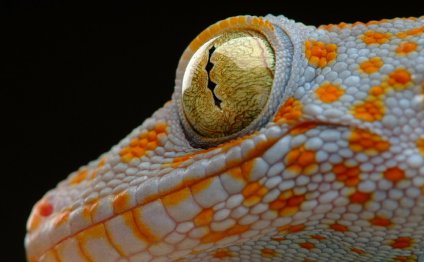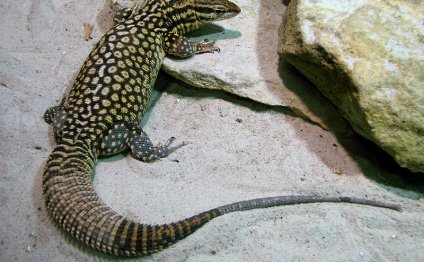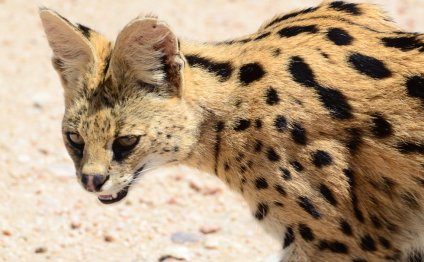
Exotic animals for sale USA
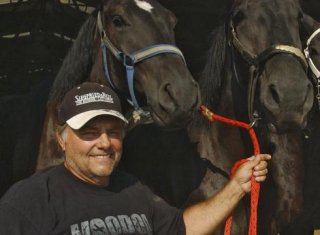
By Dennis Cauchon and Dan Vergano, USA TODAY
Updated
ZANESVILLE, Ohio Three leopards, two monkeys and a grizzly bear that survived the intentional release and subsequent killing of exotic animals here this week could be returned to the family farm where they lived in captivity before the suicide of their owner, law enforcement and zoo officials say.
- 2008 photo by Chris Crook, Zanesville Times Recorder via AP
Terry Thompson stands with some of his award-winning Percheron horses on his farm near Zanesville, Ohio. Thompson freed dozens of exotic animals he owned, then killed himself Tuesday, officials say.
2008 photo by Chris Crook, Zanesville Times Recorder via AP
Terry Thompson stands with some of his award-winning Percheron horses on his farm near Zanesville, Ohio. Thompson freed dozens of exotic animals he owned, then killed himself Tuesday, officials say.
Terry Thompson, 62, freed all but six of his exotic animals before shooting himself to death Tuesday evening. Fifty tigers, lions, bears, wolves and other wild animals died in farm fields and woods near Interstate 70 in central Ohio — 48 of them shot to death by law enforcement officers in the hectic hours after the animals were set free.
The dead animals were buried on the 73-acre Thompson property. The six surviving animals were the only ones not freed. They were taken to the Columbus Zoo, where they were reported in good health Thursday.
The animals are now the property of Thompson's widow, Marian, who helped care for them and is reluctant to give them up.
"These animals were like kids to her, " Muskingum County Sheriff Matt Lutz says. "She probably spent more time with these animals than some parents spend with their kids."
AP
Animal carcasses lay on the ground at the Muskingum County Animal Farm on Wednesday.
Jack Hanna, Columbus Zoo director emeritus, says he tried to explain to Marian Thompson why the surviving animals had to be removed from the property. The retired sixth-grade teacher was estranged from her husband and not living on the property when he turned the animals loose.
"She was confused and sad, " Hanna says. "I said, 'I'm not taking your babies or children. I'm taking your animals to the zoo.'"
"She was very distraught, " Lutz says.
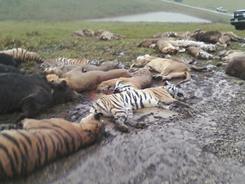 The leopards and young grizzly were thin, says Doug Warmolts, director of animal care at the Columbus Zoo.
The leopards and young grizzly were thin, says Doug Warmolts, director of animal care at the Columbus Zoo.
The monkeys — Celebes macaques, native to Indonesia — were in good health.
The zoo has been in contact with many accredited zoos ready to care for the animals, Warmolts said. He said it's up to legal authorities in Muskingum County to determine what happens to the animals. "If it's determined that the animals go back to the owner, we'll do that, " he says.
Lutz says it hasn't been decided where the animals will go.
A coroner determined that a big cat had bitten Thompson in the head within a minute of his suicide. No other animal marks were found on the body.
The only missing animal — a Japanese macaque, or snow monkey — was probably killed and eaten by a lion or tiger, Lutz says
This week's events here focused attention on how exotic animals are sold. Ohio has one auction house, Mount Hope Auction in Mount Hope, where exotic animals are legally sold three times yearly, says Laura Jones of the Ohio Department of Natural Resources. The auction house stopped selling bears, tigers and other big cats last year.
Auction houses in states such as Missouri and Texas sell large exotic animals. Lolli Bros. Livestock Market in Macon, Mo., lists the sale last month of a lion cub for $700. Bear cubs sold from $300 to $700 at the Mount Hope auction house, according to co-owner Thurman Mullet.
"It's a free country, and some people argue you should be able to own whatever you want, " says Mac Stoutz of ExoticPetCo.com, based in New Orleans, which sells rare animals such as spider monkeys for $8, 500. "Personally, I wouldn't sell someone a lion or a bear. But the reality is that we have animals that zoos don't. And some people will want them."
Exotic-pet websites advertise rare animals. "And sometimes people just show up on a curb with a box of lion cubs for sale, " says Joe Maynard of the Zoological Association of America, based in Punta Gorda, Fla.
"You do have people making a living breeding tiger cubs, " says Ian Robinson of the International Fund for Animal Welfare. "They charge people to have a picture taken with a cub outside shopping malls or at state fairs, but the cubs grow up and they have to sell them."
Carol Baskin of Big Cat Rescue in Tampa says small exhibitors offering photo opportunities with tiger and lion cubs are the biggest source of illicit big cats.
Legally, exhibitors can charge people to have their picture taken only with lion or tiger cubs 8-12 weeks old, she says.
"So what do they do then? They get rid of them any way they can. Most of it being done on the sly, with no paperwork, just sold or given away to people who think the cub would be a cute pet, " Baskin says.
The Humane Society of the United States has promoted legislation to more tightly regulate the sale of monkeys and dangerous reptiles on a federal level. "What we would really like to see is a federal law to govern ownership, " Robinson says, regarding big cats. "However that is very difficult in the current political environment."
See also:
- All of our Russian Blue Kittens for sale are fully certified purebred. Our russian blue kittens for sale are vet-checked, vaccinated, and dewormed before joining their forever homes. They socialize from a very young age and spend much time with kids, other animals, and people of all ages.
RELATED VIDEO
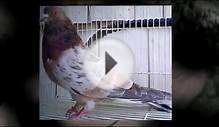


Share this Post
Related posts
Colorful lizard
A very large species of chameleon that is endemic to forests in eastern and northern Madagascar. They reach up to 68 cm (27…
Read MoreUnique animals for sale
Llamas have been a part of our farm for nearly 25 years, and they are a huge part of our lives. We really love them. They…
Read More

